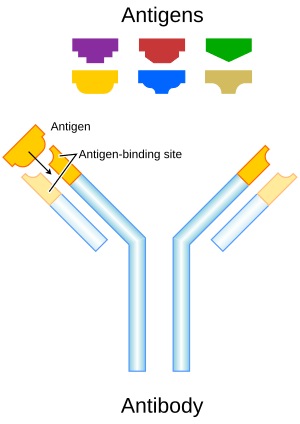Antigen facts for kids
An antigen is a tiny molecule, often a protein, found on the surface of things like bacteria or viruses. Your body's immune system sees antigens as "foreign" or not belonging there. When your body finds an antigen, it learns to make special defenders called antibodies. These antibodies then work to fight off the invader.
Antigens are like a signal that tells your body, "Hey, something new is here!" Your immune system is usually very good at knowing what belongs in your body and what doesn't. If it makes a mistake and attacks your own body's molecules, it can cause something called an Autoimmune disease.
Antigens can be found on many things, such as bacteria, viruses, pollen from plants, or even toxins.
How Antigens Work
When an antigen enters your body, it doesn't make antibodies directly. Instead, it stimulates your immune system to produce them. Think of it like a coach telling a team to get ready for a game. The coach doesn't play, but they get the players ready.
The first time your body meets a new antigen, your adaptive immune system has a full-scale response. During this first meeting, your body learns about the antigen and starts making specific antibodies just for it. This process takes a little bit of time.
Antigens and Your Immune System
The next time that same antigen tries to enter your body, your immune system remembers it! Because your body already has the specific antibodies ready, it can start fighting the infection much faster. This is why you often only get certain illnesses, like chickenpox, once. Your body remembers the antigen and quickly fights it off if it tries to come back.
This memory helps your body fight off infections you've had before much more quickly. For new illnesses, your body needs more time to learn and build up its defenses.
Antigens and Vaccines
Vaccinations are a clever way to use antigens to protect you. Most vaccines contain tiny, harmless parts of bacteria or viruses, or even dead versions of them. These parts act as antigens.
When you get a vaccine, your body is exposed to these antigens in a safe way. Your immune system then learns to make antibodies against them, just as if you had a real infection. But because the antigens in the vaccine are harmless, you don't get sick. This means your body is prepared and has the right antibodies ready to fight off the real illness if you ever encounter it.
See also
 In Spanish: Antígeno para niños
In Spanish: Antígeno para niños
 | John T. Biggers |
 | Thomas Blackshear |
 | Mark Bradford |
 | Beverly Buchanan |


